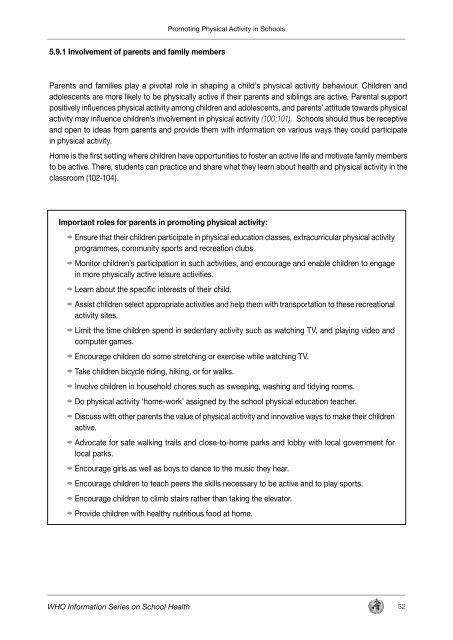WHO INFORMATION SERIES ON SCHOOL HEALTH ... - PAHO/WHO
WHO INFORMATION SERIES ON SCHOOL HEALTH ... - PAHO/WHO
WHO INFORMATION SERIES ON SCHOOL HEALTH ... - PAHO/WHO
Create successful ePaper yourself
Turn your PDF publications into a flip-book with our unique Google optimized e-Paper software.
5.9.1 Involvement of parents and family members<br />
Promoting Physical Activity in Schools<br />
Parents and families play a pivotal role in shaping a child’s physical activity behaviour. Children and<br />
adolescents are more likely to be physically active if their parents and siblings are active. Parental support<br />
positively influences physical activity among children and adolescents, and parents’ attitude towards physical<br />
activity may influence children’s involvement in physical activity (100;101). Schools should thus be receptive<br />
and open to ideas from parents and provide them with information on various ways they could participate<br />
in physical activity.<br />
Home is the first setting where children have opportunities to foster an active life and motivate family members<br />
to be active. There, students can practice and share what they learn about health and physical activity in the<br />
classroom (102-104).<br />
Important roles for parents in promoting physical activity:<br />
Ensure that their children participate in physical education classes, extracurricular physical activity<br />
programmes, community sports and recreation clubs.<br />
Monitor children’s participation in such activities, and encourage and enable children to engage<br />
in more physically active leisure activities.<br />
Learn about the specific interests of their child.<br />
Assist children select appropriate activities and help them with transportation to these recreational<br />
activity sites.<br />
Limit the time children spend in sedentary activity such as watching TV, and playing video and<br />
computer games.<br />
Encourage children do some stretching or exercise while watching TV.<br />
Take children bicycle riding, hiking, or for walks.<br />
Involve children in household chores such as sweeping, washing and tidying rooms.<br />
Do physical activity ‘home-work’ assigned by the school physical education teacher.<br />
Discuss with other parents the value of physical activity and innovative ways to make their children<br />
active.<br />
Advocate for safe walking trails and close-to-home parks and lobby with local government for<br />
local parks.<br />
Encourage girls as well as boys to dance to the music they hear.<br />
Encourage children to teach peers the skills necessary to be active and to play sports.<br />
Encourage children to climb stairs rather than taking the elevator.<br />
Provide children with healthy nutritious food at home.<br />
<strong>WHO</strong> Information Series on School Health 32

















